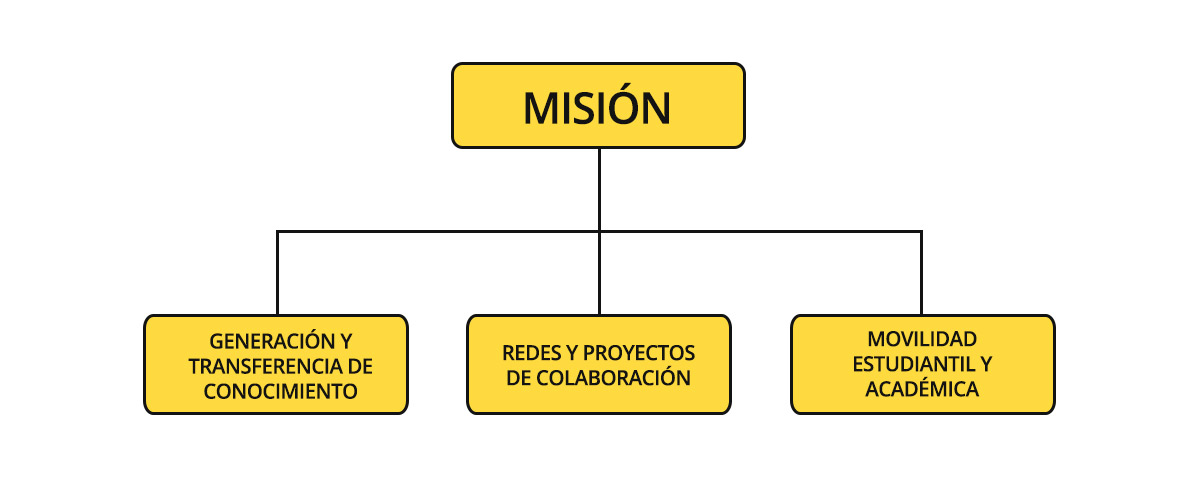

Universidad Mayor, in agreement with its institutional mission, has encouraged different strategies with the aim of internationalization in order to promote cultural diversity and bidirectional cooperation in academic topics. Internationalization is a process that has been growing in the last decades, mainly as an effect of globalization.
Internationalization not only generates benefits for the institution, but it is also a space to express its social responsibility, understood as the opportunity to improve society, through the production of knowledge that entails social transformation.
The task of the Office of International Relations (DRI in Spanish) is structured on an internationalization model that seeks projection abroad, to broaden and strengthen teaching and research abilities, student mobility, and academic exchange at Universidad Mayor.
These internationalization strategies are formalized through academic cooperation agreements between countries and bilateral agreements between universities and/or consortia. In the operational area, this model establishes a framework for the set of policies, strategies, and activities that aim to strengthen the Universidad Mayor's participation in international contexts.
Universidad Mayor has as its purpose in internationalization the implementation of different actions which allow to broaden and strengthen the participation of students, teachers, and researchers in international networks, to increase the institutional abilities, through cooperation between nations and the projection of the University abroad, thus fulfilling the goals that contribute to research, teaching, and student learning, established in the institutional strategic planning.
To achieve these objectives, the university has committed to three purposes in terms of internationalization: Knowledge Generation and Transference, Networks and Collaboration Projects, and Academic and Student Mobility. For these purposes, the Office of International Relations defines its mission as follows:
“To contribute to building international education, to foster university community participation in bidirectional cooperation alliances that enhance the generation and transference of knowledge; develop and strengthen the research; elevate the institutional abilities in teaching and increase student and academic mobility, to project the university abroad and promote diversity and cultural enrichment in its classrooms.”

1. Generation and Transfer of Knowledge: Promote international links with a view to the transfer of cutting-edge knowledge to strengthen the skills of the university community, the improvement of the academic project, and the projection of the institution abroad. It considers activities such as the participation of national and foreign academics in joint research projects and the dissemination of agreements and scholarships to guide the transfer of knowledge.
2. Networks and Collaboration Projects: Generate and maintain active alliances and international cooperation networks formally and systematically, to strengthen the areas of teaching and research through joint projects, internships, and visits, which allow us to receive academic and cultural feedback to strengthen the university work. Related activities include the development of collaborative programs globally.
3. Student and Academic Mobility: Articulate new opportunities for international teacher and student exchange through networks and formal agreements, to enhance the intercultural skills of our students and the pedagogical capacities of our teachers. It also seeks to promote our institution abroad and enrich cultural diversity on our campuses, promoting the visit of students of different nationalities, realities, and contexts. Related activities include teacher training and internships at foreign universities, visits or stays by prominent international academics to the Universidad Mayor, and the establishment of international alliances with universities of excellence for student exchange, the development of language courses, the implementation of double degree and research agreements, and the dissemination of national and international scholarships, to facilitate undergraduate, postgraduate and graduate student mobility.
The constant updating and expansion of these three axes will allow a systematic international presence to generate and transfer knowledge to and from the institution, guarantee permanent links with international organizations through networks and alliances, and promote the projection of the capacities and competencies of the institution. Major University abroad.
The Internationalization Model emanates from the Directorate of International Relations, and its purpose is to coordinate internationalization activities that seek to nurture new knowledge in our university community, promote the presence of students, graduates, academics, professionals, and international experts to provide us with feedback, expand the range of institutional competencies, and strengthen the link with the environment, a relevant area of institutional management and a fundamental requirement for accreditation processes.
The Vision of the Office of International Relations is:
“To be a fundamental unit within Universidad Mayor, fulfilling its role as an agent that generates and promotes internationalization actions, which put the institution in a position of being a referent in Chile and Latin-American because of its level of internationalization”